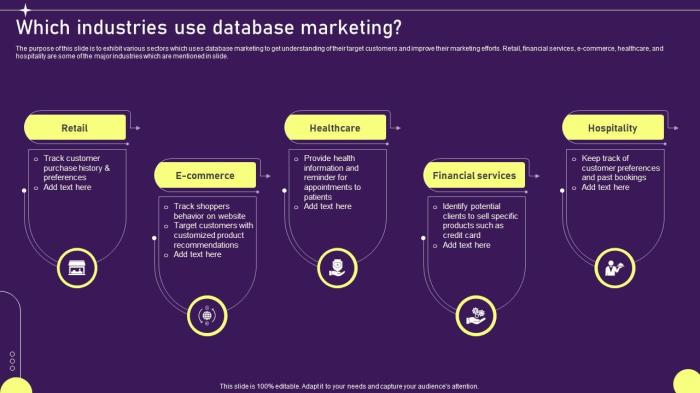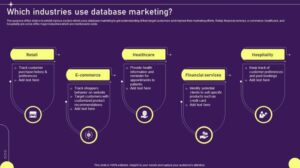
Targeted marketing databases serve as the backbone of effective marketing strategies, providing businesses with the data-driven insights needed to reach their ideal customers. By compiling essential information on consumer preferences and behaviors, these databases enable companies to tailor their marketing efforts and maximize engagement. In an age where personalized marketing is paramount, understanding the components and maintenance of targeted marketing databases becomes crucial for businesses striving to stay competitive.
The creation and management of a targeted marketing database involves identifying key attributes that characterize potential customers, implementing strategies for data collection, and ensuring data accuracy. With these elements in place, businesses can leverage innovative techniques and technological advancements to enhance their marketing campaigns, ultimately driving sales and fostering customer loyalty.
Targeted Marketing Databases
Targeted marketing databases are essential tools in modern marketing strategies, enabling businesses to effectively reach specific audiences. These databases collect and analyze consumer data, allowing companies to tailor their marketing efforts based on insights derived from customer preferences and behaviors.An effective targeted marketing database consists of several components that contribute to its overall success. These include:
- Data Collection: Gathering accurate and relevant consumer data from various sources.
- Data Segmentation: Organizing data into distinct groups based on demographics, behaviors, or purchasing patterns.
- Data Analysis: Interpreting the data to understand customer trends and preferences.
- Data Integration: Combining data from multiple sources to provide a comprehensive view of the customer.
To build and maintain a targeted marketing database, businesses should focus on consistent data updating, ensure compliance with data protection regulations, and implement robust security measures to safeguard customer information.
Business Innovation
Innovative uses of targeted marketing databases can be found across various industries, showcasing their versatility and effectiveness. For instance, retailers use these databases to create personalized shopping experiences, while healthcare providers utilize them to improve patient outreach and engagement.Technological advancements greatly impact the evolution of targeted marketing databases. Machine learning algorithms and artificial intelligence enhance data analysis capabilities, allowing companies to predict customer behaviors and preferences more accurately.
Additionally, integrating targeted marketing databases with innovative marketing strategies can lead to more personalized campaigns, ensuring higher engagement rates.
International Business
International businesses face unique challenges in managing their targeted marketing databases. Diverse market conditions, cultural differences, and varying data regulations can complicate data collection and analysis efforts. Tailoring targeted marketing databases for different international markets involves understanding local consumer behaviors and preferences, as well as aligning messaging with cultural contexts.Successful international targeted marketing campaigns, such as Coca-Cola’s localized advertising efforts, demonstrate how businesses can leverage their databases to resonate with diverse audiences worldwide.
Business Interviews
In interviews focused on the role of targeted marketing databases, asking the right questions is crucial. Here are some key questions:
- What data sources do you find most valuable in creating targeted marketing databases?
- How do you ensure data accuracy and relevance in your databases?
- Can you share an example of a successful campaign driven by your targeted marketing database?
Managing targeted marketing databases requires a set of skills including data analysis, attention to detail, and strategic thinking. Insights from professionals emphasize the importance of continuous learning and adaptation to new technologies and trends in the field.
Job Search Techniques
Targeted marketing databases can significantly assist job seekers in identifying opportunities that align with their skills and experiences. By leveraging these databases, candidates can discover potential employers who are actively seeking their qualifications.Strategies to optimize personal branding efforts using targeted marketing databases include tailoring resumes and cover letters to reflect the skills and experiences sought by employers. Networking within these databases also plays a pivotal role, as it enables job seekers to connect with industry professionals and gain insights into potential job openings.
Business Management
In effective business management, targeted marketing databases serve as a cornerstone for decision-making. Accurate and high-quality data is imperative; it ensures that marketing efforts are based on reliable insights. Training management teams to utilize targeted marketing databases efficiently involves providing them with the tools and knowledge necessary to interpret data effectively and apply it to strategic planning.
Marketing Direct
Direct marketing is inherently linked to targeted marketing databases. Utilizing these databases allows businesses to reach out directly to consumers with tailored messaging, significantly improving engagement rates.Successful direct marketing strategies driven by targeted marketing databases include email campaigns that are personalized to the recipient’s preferences and behaviors, resulting in higher conversion rates and customer satisfaction.
Business Networking
Targeted marketing databases can be leveraged to build robust business networks. They provide insights into potential partners and collaborators, facilitating connections that can lead to successful partnerships.The significance of targeted marketing databases in professional networking events lies in their ability to help businesses identify and engage with key stakeholders within their industry.
Business Outsourcing
Targeted marketing databases optimize outsourcing decisions by providing data-driven insights into market trends and consumer preferences. This information allows businesses to make informed choices regarding which marketing functions to outsource.Using targeted marketing databases when outsourcing marketing functions offers advantages such as access to specialized expertise and the ability to scale efforts quickly. Examples of successful outsourcing strategies include companies that use data analysis to identify the best external partners for their marketing needs.
Business Presentation
When preparing a presentation about targeted marketing databases, key points to include are the importance of data segmentation, the impact of technology on the effectiveness of marketing strategies, and case studies of successful implementations.Creating a visual representation of how targeted marketing databases function within a business model can enhance understanding and engagement during presentations, showcasing the flow of data and its applications in marketing strategies.
Business Productivity
Enhancing business productivity through targeted marketing databases involves leveraging data to streamline operations. Organizations can improve employee efficiency and workflow by utilizing data insights to inform decision-making processes.Tools that can improve productivity related to targeted marketing databases include customer relationship management (CRM) systems, analytics software, and automated marketing platforms that facilitate data integration and analysis.
Restaurant Industry

In the restaurant industry, targeted marketing databases have specific applications that help businesses attract and retain customers. Restaurants can analyze customer preferences and behavior to tailor their marketing efforts effectively.Successful targeted marketing strategies used by restaurants often include personalized promotions based on customer purchase history, which can lead to increased customer loyalty.
Resumes Cover Letters
When applying for roles involving targeted marketing databases, tailoring resumes and cover letters is crucial. Highlighting specific skills such as data analysis, customer segmentation, and marketing automation can set candidates apart.Data-driven storytelling in resumes and cover letters is essential; candidates should present their experiences in a way that showcases their ability to leverage data for effective marketing strategies.
Business Retail
Targeted marketing databases significantly enhance customer experience in the retail sector. Retailers can use these databases to create personalized shopping experiences, driving higher customer satisfaction and loyalty.Examples of personalized marketing efforts in retail include customized email campaigns based on previous purchases and targeted advertisements that resonate with specific customer segments.
Risk Management
Managing targeted marketing databases involves inherent risks, including data breaches and inaccuracies. Implementing strategies for mitigating these risks is crucial for maintaining consumer trust and compliance with regulations.Risk management frameworks applicable to targeted marketing databases include regular data audits, robust security protocols, and employee training on data privacy and protection.
Business Sales
The role of targeted marketing databases in enhancing sales strategies cannot be overstated. They provide sales teams with crucial insights into customer preferences and purchasing behaviors, allowing for more effective outreach.Sales techniques that utilize targeted marketing data include personalized follow-ups and tailored product recommendations, which can lead to increased conversion rates and customer satisfaction.
Sales Management
Sales managers can utilize targeted marketing databases to drive performance by tracking metrics such as customer engagement and conversion rates. This data enables managers to refine their strategies and optimize their teams’ efforts.Training sales teams on the use of marketing databases is essential for ensuring that they can leverage data effectively to improve their sales tactics and outcomes.
Sales Teleselling

Targeted marketing databases enhance teleselling strategies by providing sales representatives with valuable insights into customer preferences. This information can be used to tailor conversations and improve engagement during calls.Successful teleselling campaigns driven by targeted marketing insights often involve proactive outreach based on customer data, resulting in higher success rates.
Sales Training
Creating a training program focused on utilizing targeted marketing databases in sales is vital for equipping teams with the skills necessary to succeed. Essential skills include data interpretation, customer engagement strategies, and familiarity with marketing tools.Resources and tools available for developing sales training materials focused on marketing databases include online courses, webinars, and industry conferences that cover the latest trends and best practices.
Business Security
Protecting targeted marketing databases requires implementing security measures such as encryption, access controls, and regular security audits. These measures help safeguard sensitive customer data from breaches.Data breaches have significant implications for targeted marketing efforts, as they can damage consumer trust and lead to regulatory penalties. Businesses must adopt stringent guidelines to ensure the integrity of their marketing databases.
Small Business
Small businesses can greatly benefit from targeted marketing databases by leveraging them to understand their customers better and tailor their marketing efforts accordingly. These databases enable small businesses to compete effectively in larger markets.Cost-effective methods for building marketing databases may include utilizing free or low-cost data collection tools and focusing on organic data gathering techniques such as customer surveys and social media engagement.
Solo Professionals
For solo professionals, targeted marketing databases offer significant advantages by providing insights that can enhance their marketing efforts. These databases enable solo professionals to identify and connect with potential clients more effectively.Strategies for creating and maintaining marketing databases include utilizing simple CRM tools and continuously updating data to reflect the most current client interactions and preferences.
Strategic Planning
Incorporating targeted marketing databases into strategic business planning is essential for organizations aiming to align their efforts with market demands. Data analysis can inform key business decisions, ensuring that strategies are data-driven and relevant.Frameworks for aligning marketing databases with business objectives involve setting clear goals, identifying key performance indicators, and regularly reviewing data to assess progress and make necessary adjustments.
Team Building
Targeted marketing databases impact team collaboration and communication by providing a shared resource for data-driven decision-making. Teams can work together more effectively when they have access to consistent and accurate data.Creating cross-functional teams focused on database utilization fosters a culture of collaboration and innovation. Encouraging open communication regarding data use can enhance overall team performance and outcomes.
Venture Capital
Targeted marketing databases can attract venture capital investments by demonstrating a business’s potential for growth through data-driven insights. Investors seek companies that can show a clear understanding of their target market.Presenting marketing database insights in pitches to venture capitalists involves showcasing data analytics and highlighting successful case studies that illustrate the business’s market potential.
Workplace Communication
Clear communication regarding targeted marketing database strategies is vital within organizations. Enhancing communication around data use promotes transparency and encourages collaboration among team members.Successful communication strategies related to targeted marketing databases include regular updates on data utilization, setting clear expectations for data handling, and fostering an open environment for discussing insights and findings.
Workplace Safety
Maintaining data privacy and safety in targeted marketing databases requires careful considerations. Implementing best practices for data handling is essential for minimizing risks and ensuring compliance with regulations.Training staff on secure database management practices is crucial for promoting a culture of data safety within the workplace. Regular training sessions can help reinforce the importance of protecting sensitive information.
Last Recap
In summary, targeted marketing databases are invaluable tools that empower businesses to refine their marketing strategies and achieve measurable results. By investing in these databases, companies can not only streamline their outreach efforts but also cultivate deeper relationships with their customers. As technology continues to evolve, the potential for targeted marketing databases to transform business practices will only grow, making them essential in today’s data-driven landscape.
Essential FAQs
What are targeted marketing databases?
Targeted marketing databases are organized collections of consumer data that inform and enhance marketing strategies by focusing on specific audience segments.
How can small businesses benefit from targeted marketing databases?
Small businesses can tailor their marketing efforts, improve customer engagement, and optimize costs by utilizing targeted marketing databases to identify and reach their ideal customers.
What is the significance of data accuracy in targeted marketing databases?
Data accuracy is crucial as it ensures that marketing strategies are based on reliable information, leading to more effective campaigns and better customer relationships.
How often should businesses maintain their targeted marketing databases?
Businesses should regularly update their targeted marketing databases to reflect changes in consumer preferences and market conditions, ensuring the effectiveness of their marketing efforts.
What role does technology play in enhancing targeted marketing databases?
Technology provides tools for data collection, analysis, and management, enabling businesses to create more sophisticated and actionable targeted marketing databases.




